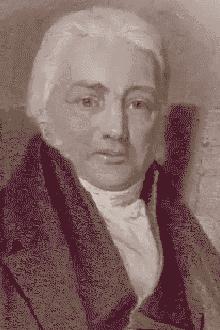Samuel Taylor Coleridge
(1772-1834)"In the same sense that the sciences of arithmetic and geometry, that mind, that life itself, have reality; the Constitution has real existence, and does not the less exist in reality, because it both is, and exists as, an idea."

"The Idea of the Constitution"
by Samuel Taylor Coleridge
Ask any of our politicians what is meant by the Constitution, and it is ten to one that he will give a false explanation; as for example, that it is the body of our laws, or that it is the Bill of Rights; or perhaps, if he have read Thomas Payne, he may say that we do not yet possess one, and yet not an hour may have elapsed, since we heard the same individual denouncing, and possible with good reason, this or that code of laws, the excise and revenue laws, or those for including pheasants, or those for excluding Roman Catholics, as altogether unconstitutional; and such and such acts of Parliament as gross outrages on the Constitution. Mr. Peel, who is rather remarkable for groundless and unlucky concessions, owned that the late Act broke in on the Constitution of 1688: whilst in 1689 a very imposing minority of the then House of Lords, with a decisive majority in the Lower House of Convocation, denounced this very Constitution of 1688, as breaking in on the English Constitution.
But a Constitution is an idea arising out of the idea of a State; and because our whole history from Alfred onwards demonstrates the continued influence of such an idea, or ultimate aim, on the minds of our forefathers, in their characters and functions as public men, alike in what they resisted and in what they claimed; in the institutions and foms of polity, which they established, and with regard to those against which they more or less successfully contended; and because the result has been a progressive, though not always direct or equable, advance in the gradual realisation of the idea; and because it is actually, though even because it is an idea not adequately, represented in a correspondent scheme of means really existing; we speak, and have a right to speak, of the idea itself, as actually existing, that is, as a principle existing in the only way in which a principle can exist, -- in the minds and consciences of the persons whose duties it prescribes, and whose rights it determines. In the same sense that the sciences of arithmetic and geometry, that mind, that life itself, have reality; the Constitution has real existence, and does not the less exist in reality, because it both is, and exists as, an idea.
"Loyalty... is a realization that America was born of revolt, flourished in dissent, became great through experimentation."
Henry Steele Commanger
"Freedom, Loyalty, and Dissent"
The American Experiment in Democracy:
200+ Years and Still Going Strong...
"Ture democracy means the ability to remove a government without violence, to punish political failure or misjudgment by votes alone... The art of politics is the minimization of unhappiness, or of unavoidable suffering... The process of avoiding suffering is greatly assisted by the existence of free institutions. The greater their number, variety and intrinsic strength, and the greater their individual independence, the more effective the democracy which harbours them will be. All such institutions should be treated like fortresses: that is, soundly constructed and continually manned... "Free institutions will only survive when there is the rule of law. This is an absolute on which there can be no compromise: the subjection of everyone and everything to the final arbitration of the law is more fundamental to human freedom and happiness than democracy itself... Once the law is humbled, all else that is valuable in a civilized society will vanish, usually with terrifying speed. On the other hand, provided the rule of law is maintained intact, the evil forces in society, however powerful, will be brought to book in the end - as witness the downfall of the Nixon administration."
Paul Johnson
"The Enemies of Society"
"We the People of the United States, in Order to form a more perfect Union, establish Justice, insure domestic Tranquility, provide for the common defence, promote the general Welfare, and secure the Blessings of Liberty to ourselves and our Posterity, do ordain and establish this Constitution for the United States of America." 
Signed in 1789, the United States of America has the oldest existing constitution still in use in the world (with Norway coming in second place with their constitution dating back to 1814). To my knowledge, the United States is the only country to base its society not on a shared past or culture but on an idea, that of political freedom: life, liberty, and the pursuit of happiness.
From the Preamble of the United States of America
Ratified by the 13 colonies in 1789
LIVE FREE OR DIE!
Motto of the State of New Hampshire
"Although it had flaws and is still not perfect, our Constitution has allowed a system of government to flourish with freedom and opportunity unequaled anywhere in the world before or since. The United States has no need for walls or laws to keep people from moving elsewhere; and for over 200 years countless millions of people have come here from all parts of the globe, creating a society of pluralism and diversity resting on liberty.
"For being an American and enjoying the fruits of our Constitution - the liberty and opportunity that our system of self-government makes possible - is a lifelong adventure. It is a prviledge that carries responsibilities we must all fulfill."
Warren E. Burger
"The Constitutions: Foundation of Our Freedom"
"The Idea of the Constitution"
by Samuel Taylor Coleridge
![]()
